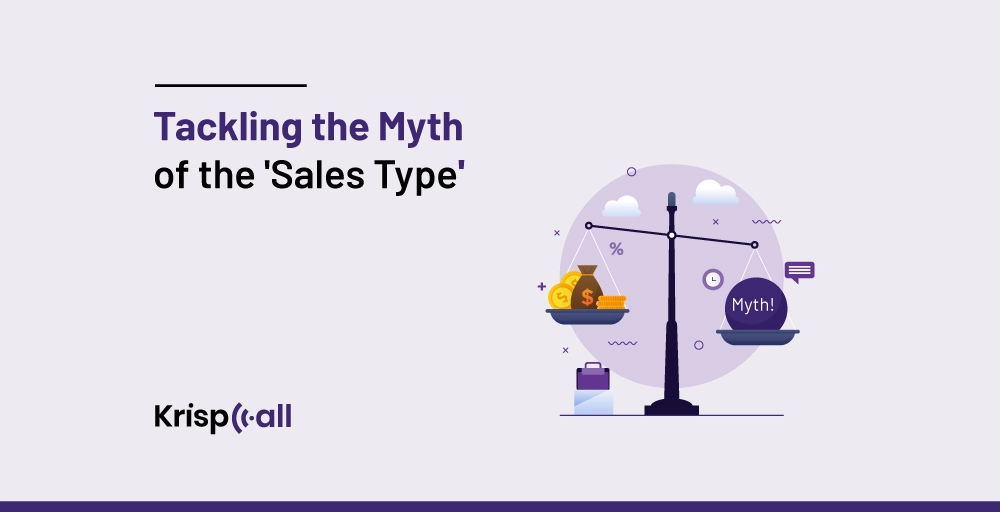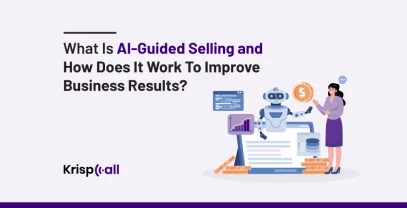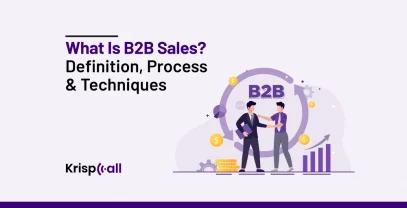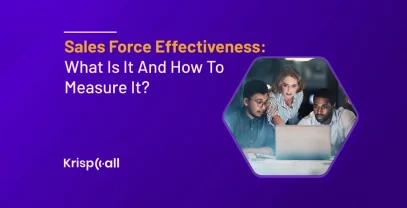Various myths are roaming in the individual 🤔 perception. In fact, many people believe that they also have the ability to sell any product to anyone.
But that’s not possible, as it’s totally a 😐 misconception. You must train yourself hard to gain certain skills that help you connect with customers, understand their problems, and provide them with solutions.
Similarly to this myth, this guide will address several other myths related to sales type and how to tackle such myth of the sales type. Additionally, we will explore what the future of sales might entail.
🔑KEY HIGHLIGHTS
- Anyone can sell, great salespeople are natural deal-closers, and only extroverts succeed in sales are common myths in the sales type.
- Always offering discounts can devalue your products and services in the eyes of customers.
- Even if you have a high-quality product, you need a strong marketing strategy to sell it.
- The future of sales may involve hybrid sales models, tech-empowered salespeople, and consultative sellers.
Tackling popular myth of the sales type & salespeople
The world of sales has long been shrouded in misconceptions. From the “pushy used-car salesman” to the “gift of the gab” stereotype, these myths paint an inaccurate and limiting picture of the sales profession.
Here are some of the common myths:
1. Anyone can sale
The concept that “Anyone can sell” suggests that the selling skill can be readily acquired by individuals. But not for everyone.
The truth is anyone can learn how to sell but for this, you require unique traits and skills. Some top salespeople might have a natural ability to connect with people, give their customers an opportunity to express their needs and understand their requirements.
However, the misconception everyone is qualified to sell fails to recognize the consequence of possessing these impressive features and the commitment required to cultivate them. You eventually need to develop a skill that requires time, customer listening, experience, coaching, and accurate data access but you are not born with these things.
2. Great salespeople are natural deal-closers
Sales is a frontline role that involves comprehensive relations with numerous people. A prevalent myth in sales is that a great salesperson has a natural ability to finalize deals.
In reality, a lot of them are facing challenges when it comes to finalizing the deals. Being excellent at sales requires proper training, regardless of your personality traits. Some of the most successful sales professionals aren’t ‘natural-born closers. In fact, many top salespeople struggle with closing.
Undoubtedly, great salespeople work hard on building a certain skill to connect with customers faster and close more deals. The real salesperson mainly focuses on effective communication, relationship building, and customized solutions rather than solely depending on natural charisma or sales ability.
3. Only extroverts can succeed in sales
The myth that “only extroverts can succeed in sales” has been a substantial obstacle for numerous individuals in their pursuit of excelling in sales
The belief is that extroverts are known for being sociable and outgoing. They are better with their ability to easily engage with others and are suited for sales. Research and industry professionals have disproven this myth success in sales is not sole to individuals with extroverted qualities.
In reality, introverts hold unique strengths that are just beneficial in the sales world. With their attentiveness and thoughtful communication, they have the ability to build trust, understand customers’ needs, and enable strong relationships. Research indicates that there is no specific personality quality in sales, indicating that both extroverts and introverts can excel in sales roles with the right skills, tactics, and mindset.
Those who are good at listening are usually the best salespersons. They exhibit patience and allow their customer to express themselves. They understand that the focus should be on their customer, not themselves.
4. Salespeople are aggressive and pushy to close deals
The myth that salespeople are aggressive and pushy to close deals is outdated and inaccurate. Currently, successful salespeople mainly focus on building relationships and understanding the requirements of their customers, rather than pressuring them into decisions.
However, industry professionals have disproved this myth, highlighting that salesmanship is based on building strong relationships and comprehending client requirements rather than coercion. In fact, employing aggressive strategies can backfire, damaging trust and pushing potential customers away.
Great sales professionals serve as consultants, offering solutions that genuinely tackle customer obstacles and deliver benefits.
5. Lower prices attract more customers
The common misunderstanding in sales and pricing strategies is that lower prices attract more customers.
The opinion indicates that companies can increase their revenue by reducing the price of their products or services. The myth regarding pricing and customer behavior is oversimplified, emphasizing the complex interplay between pricing and consumer behavior.
In reality, the connection between customer attraction and price is more nuanced. Lower prices may originally attract price-sensitive customers, but there is no assurance of a significant increase in total or revenue sales volume. If you blindly reduce your prices without considering the brand reputation and customer requirements, it can lead you to a race to the bottom.
6. Discount is everything
The mistaken belief that discount is everything is widespread in the sales sector. Offering discounts is the primary strategy for attracting customers and numerous individuals believe in prioritizing price reductions.
However, discounts can be beneficial but placing too much focus on lowering prices may devalue your products and service among customers. Draw in bargain-hunting customers, setting unattainable customer standards, may decrease customer loyalty over time. If the salesperson doesn’t understand that discounts should be used strategically and sparingly there will be a hindered connection between customers and salesperson.
By focusing on value, customer experience, and long-term business sustainability, the sales professional has an opportunity to understand strategy toward sales.
7. Cold outreach is no longer effective
The misunderstanding that cold outreach is no longer effective has acquired traction in the sales industry.
Although there are particular classic approaches, such as impersonal group emails, this kind of strategy may no longer be useful, but if salespeople execute strategically, cold outreach can even serve as useful support.
The truth is, nowadays success depends upon salespeople’s strategy and cold outreach has now evolved. Sales professionals rely on the data and research to identify optimal prospects with genuine requirements, rather than simply reaching or contacting a random individual.
8. A script is necessary for sales success
The sales script is the key to success in sales is a myth. While it can be helpful for beginners as a training tool, the script can be easily recognized by the customer and it may feel impersonal and fake. It can be very helpful at starting but the real salespeople come after mastering listening and building genuine connections between customers.
When you utilize the script it may hinder your natural and organic flow of communication and restrict the capacity to connect with your customer on a personal level. The truth about salespeople is that they mainly focus on active listening, understanding customer requirements, and establishing relationships with trust and empathy.
Salespeople have to focus on building rapport, understanding customer needs, and delivering value through a genuine conversation. By prioritizing authentic connection over scripted delivery, you will be well on your way to sales success.
9. Do not follow up too quickly after sending a proposal
Following up is a necessary aspect when it comes to business but respecting a prospect’s decision is more important. Continuously following up may cause you to end up on the bad side of your potential customers.
But just playing the game of guessing is also not the proper option, so following up with your prospects and delivering additional value, in the form of some useful content, a video testimonial from a similar customer in their industry can prove to be beneficial.
Don’t just ask for a decision. Briefly highlight the value proposition of your proposal and reiterate your desire to discuss it further.
10. The best product always wins
One of the biggest myths in the sales world is that the best product always wins. But to be honest, this is true only to some extent.
As Estee Lauder mentioned, “If you don’t sell, it’s not the product that’s wrong; it’s you.” Having a great product can always provide a unanimous advantage over competitors, but at the end of the day, the product doesn’t sell itself. Proper marketing and how you describe your products to potential customers determines the sale.
If the sales representative just comes in bragging all sorts of things about the features and functions only, then the chance of selling it will come drastically down. On the other hand, the sales team that describes how their product will solve the customer’s problem is the one who will walk away with the win.
What does the future of sales look like?
The future of sales is a fascinating blend of technology, human, connection, and a focus on value creation. Here are some future sales predicted to be influenced by various key trends and technologies.
1. The hybrid sales model
Remote work is here to stay. The future will likely see a hybrid model with a mix of virtual and in-person interactions. Salespeople will need to be adept at building rapport and closing deals through video conferencing and other online tools.
It allows companies to leverage the strengths of both worlds to reach and engage with customers more effectively. By embracing its benefits, businesses can create a more adaptable and successful sales force.
2. Tech-empowered salespeople
Imagine salespeople as data-driven ninjas. Ai will automate repetitive tasks like lead qualification and scheduling, freeing reps to focus on strategic conversations, powerful analytics will provide deep customer insights, allowing for hyper-personalized outreach and presentations.
By embracing technology and leveraging its capabilities, salespeople can achieve greater success, build stronger customer relationships, and navigate the ever-evolving sales landscape.
3. The rise of the consultative seller
Forget the pushy salespeople stereotype. The future belongs to the consultative sellers who act as trusted advisors. These pros will excel at understanding customer challenges and crafting solutions that perfectly fit their needs.
Building strong relationships and exceeding expectations will be paramount. By prioritizing customer needs, building trust, and offering valuable solutions, consultative sellers are well-positioned to thrive in the ever-changing world of sales.
4. The evolving customer journey
The way buyers research and make decisions is constantly changing. Sales teams will need to adapt their approach to meet customers whenever they are on the buying journey. This might involve creating targeted content ( like webinars or social media posts) to address specific pain points at different stages.
By adapting their strategies, creating a seamless omnichannel experience, and prioritizing customer needs, businesses can win over customers in today’s dynamic landscape.
5. The importance of ethics and transparency
As technology allows for more data collection and personalization, ethical considerations will be crucial. Customer will prioritize companies that are transparent about how their data is used and respectful of their privacy. Building trust through honesty and ethical practices will be essential.
By prioritizing for both, businesses, organizations, and individuals can create a more positive and sustainable future for all.
Final Thoughts
The misconception of sales type is widely spread around the world. Some common myths are anyone can sell, only extroverts can succeed, discounts are everything and salespeople are aggressive and pushy to close deals.
However, these are all just a myth. Not everyone can be a successful salesperson that truly understand customer behaviour and preferences. In addition, extrovert and introvert both can be a saleperson as it entirely depends on their personality of how they deal with customers.
Closing deals fully belong to individuals who have the ability to solve problems and build genuine relationships with customers. Lowering price or providing discounts doens’t help your business success in long-term.





